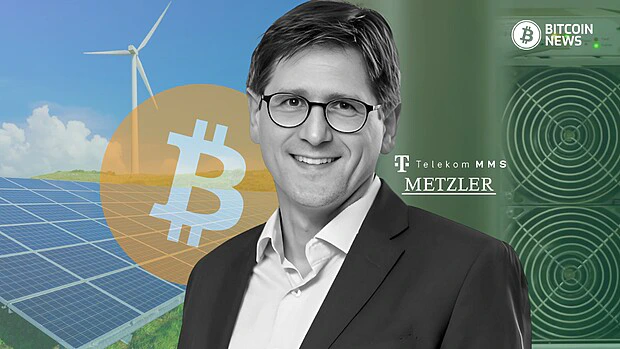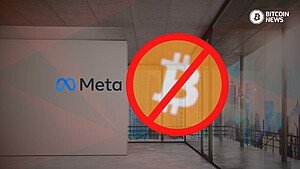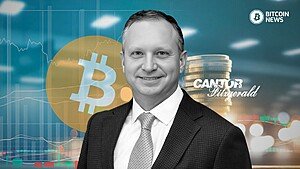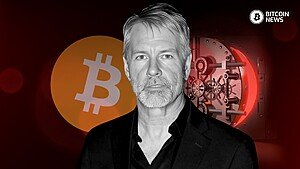In an innovative move, Deutsche Telekom, Europe’s largest telecommunications provider, is diving into the Bitcoin mining industry by launching a project to use excess renewable energy for mining.
The venture is being piloted by Deutsche Telekom’s subsidiary, MMS, in collaboration with German Metzler Bank (Bankhaus Metzler).
Together, the companies aim to leverage the unpredictable nature of renewable energy sources, like solar and wind, to stabilize Germany’s energy grid and support sustainable practices in the energy and blockchain industries.
The project, announced through a press release on November 4, addresses an issue facing many renewable energy sources: surplus energy. When renewable sources, such as wind or solar power, generate more electricity than is immediately needed or can be stored, the excess often goes to waste.
With this pilot, Deutsche Telekom and its partners will use surplus energy to mine bitcoin, converting unused electricity into the hard, scarce digital money.
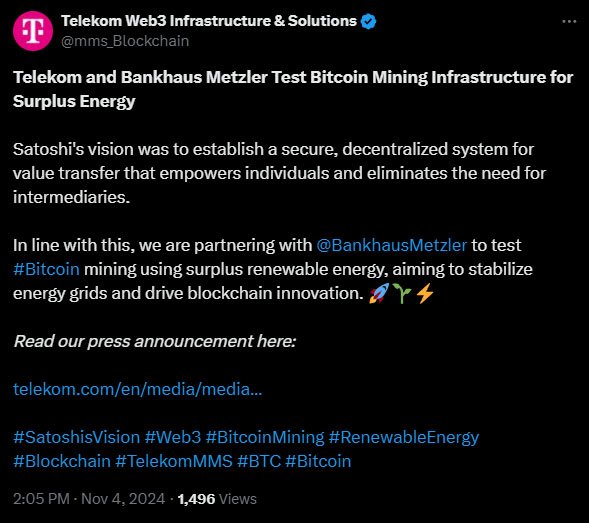
Oliver Nyderle, Head of Digital Trust & Web3 Infrastructure at Deutsche Telekom MMS, described the project as a way to harness renewable energy’s full potential. He stated:
“With the growing number of renewable energy sources and the resulting fluctuations in available energy, the need for quickly available control power is increasing. For this, we need mechanisms that can react quickly to changes and absorb fluctuations.”
Nyderle explained that, in partnership with Bankhaus Metzler and RIVA Engineering GmbH, they are exploring how Bitcoin mining can help stabilize the energy grid. By converting surplus energy into digital assets, they aim to harness what he calls “digital monetary photosynthesis.”
Deutsche Telekom’s pilot project is taking place at RIVA Engineering’s facility in Backnang, Germany, where a photovoltaic (solar) system already generates power.
Under the pilot, MMS will manage the mining devices, and the facility’s excess electricity will be used to power the bitcoin mining operation.
By utilizing surplus energy, the project could provide valuable insights into how bitcoin mining might stabilize the grid, potentially serving as a flexible load that can absorb energy fluctuations and prevent waste.
The concept is relatively straightforward: when surplus energy from renewable sources is available, bitcoin mining rigs at the site will kick into action, converting the excess energy into bitcoin.
This approach has the potential to turn Germany’s energy excess into a valuable digital asset while reducing strain on the grid.
Nyderle emphasized the project’s strategic focus on the environmental benefits of blockchain technology.
This approach could mark a shift in the traditionally energy-intensive bitcoin mining industry, which often draws criticism for its carbon footprint. By leveraging renewable energy, the pilot could demonstrate that bitcoin mining can be both sustainable and beneficial to the energy sector.
The collaboration between Deutsche Telekom MMS and Bankhaus Metzler also underscores the companies’ broader goals of advancing blockchain technology in Germany.
In a country that’s becoming increasingly aware of its energy needs and environmental impact, the pilot could set a precedent for future blockchain initiatives.
“Our goal is to gain experience in various application areas to further advance the innovative power of blockchain technology in Germany. Therefore, we are very pleased to be part of this pilot project with Telekom MMS.” said Hendrik König, Head of Digital Assets Office at Bankhaus Metzler.
He added that blockchain technology is gaining traction in operational businesses outside the financial industry and that a trusted financial partner is crucial for managing digital assets effectively.
If successful, the pilot could lead to similar initiatives across Germany, encouraging a greener and more efficient approach to Bitcoin mining. Notably, this project builds on Deutsche Telekom’s previous work in blockchain infrastructure.
During the BTC Prague event in June earlier this year, Dirk Röder, Deutsche Telekom’s Head of Web3 Infrastructure and Solutions revealed that the telecommunications giant is already running a Bitcoin Core and Lightning node.
Germany’s new approach to bitcoin mining follows successful examples from countries like the United States and Finland, where bitcoin mining has been used to balance energy grid demands.
In both cases, miners act as a “flexible load,” meaning they turn on when there is surplus power and turn off when demand rises. This flexibility allows energy grids to remain stable, especially during periods of renewable energy fluctuation.
Related: Bitcoin Mining Clean Energy and Grid Balance | ERCOT Study
The benefits of this flexible load approach are especially relevant to Germany, where renewable energy sources like wind and solar power make up a significant portion of the energy supply.
Deutsche Telekom and Bankhaus Metzler’s partnership signals a new chapter in Bitcoin mining. Unlike other countries where low energy costs often drive mining operations, Germany’s approach is rooted in sustainability.
By using renewable energy to power the mining process, the pilot project not only aims to make bitcoin mining more eco-friendly but could also change public perceptions of the industry, especially in a country known for its environmental standards.
The timing of the project is notable, as it reflects an increasing global awareness of Bitcoin mining’s environmental impact. Critics often argue that Bitcoin’s energy consumption is wasteful, but this project seeks to demonstrate that mining can have a positive role in the energy sector.
By stabilizing renewable energy sources and preventing waste, Deutsche Telekom’s initiative may offer a blueprint for other companies and countries to adopt similar strategies.

